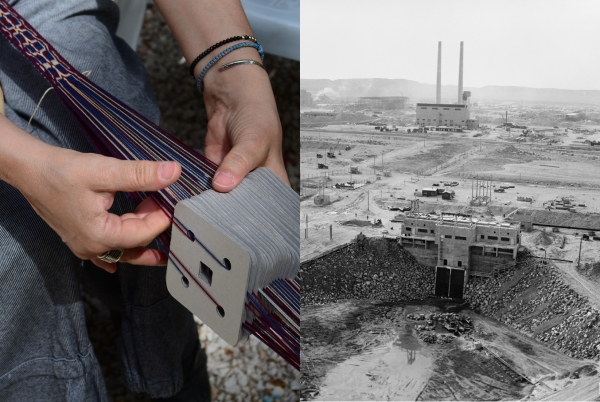As an environmental
historian, I work with the toxic legacies of humankind. Some are ‘tamed’ for the moment, encased in concrete, sealed against
groundwater intrusion. Some are monsters, in the sense of being frightening, large, strange and hard, if not impossible to
control. Their monstrosity is as much a social and economic as a technical and scientific one. Many of the monsters, such
as Hanford (USA) or Pokhran (India) stem from war preparations.
My work has led me
to critique the SDGs, the Sustainable Development Goals, for not including toxic legacies and the corruption happening in
their clean-up in a meaningful way. Along that path, I realized how absurd the depiction of a network of integrated and connected
goals as a neatly sorted array of quadrangles is. Together with mathematician and weaver Ellen Harlizius-Klück and textile
restoration expert Charlotte Holzer, I started an experimental project: "Weaving the SDGs". The knowledge I acquired through
working with my hands, learning to produce tablet-woven bands, has transformed the way I conceive of transformative learning,
of education for sustainability. It has also helped me deal with the feeling of helplessness that comes with scholarly work
on toxic legacies and environmental grief in general. With handicraft interventions, the methodical repertoire of sustainability
research as a transdisciplinary practice becomes tangible.
Access
only with valid 2.5G attestation and FFP2 mask
Verena
Winiwarter is an engineer for technical chemistry, a studied historian and journalist, a habilitated human ecologist,
and professor for environmental history at the Institute for Social Ecology of the University of Natural Resources and Life
Sciences in Vienna. She is co-founder of the Center for Environmental History, and the founding president of the European
Society for Environmental History, as well as of the International Consortium of Environmental History Organisations (until
7/19). Verena chairs the Commission for Interdisciplinary Ecological Studies of the Austrian Academy of Sciences, of which
she has been a full member since 2016. Since 2019, she also chairs the Council of Environmental Experts of the City of Vienna.
Together with Hans-Rudolf Bork, she wrote “Geschichte unserer Umwelt. 66 Reisen durch die Zeit” which was Science Book of
the Year in Austria in 2015 and Environmental Book of the Year in Germany. The book "Wasser Stadt Wien" which was compiled
under her direction is a synopsis of more than ten years of interdisciplinary research. Verena has received numerous awards
including "Scientist of the Year 2013" (Club of Educational and Scientific Journalists), Grand Decoration of Honor of the
Province of Carinthia (2015), and a Honorary Doctorate from Aalborg Universitet, Denmark. Since 2020 she is also a member
of Academia Europaea.




